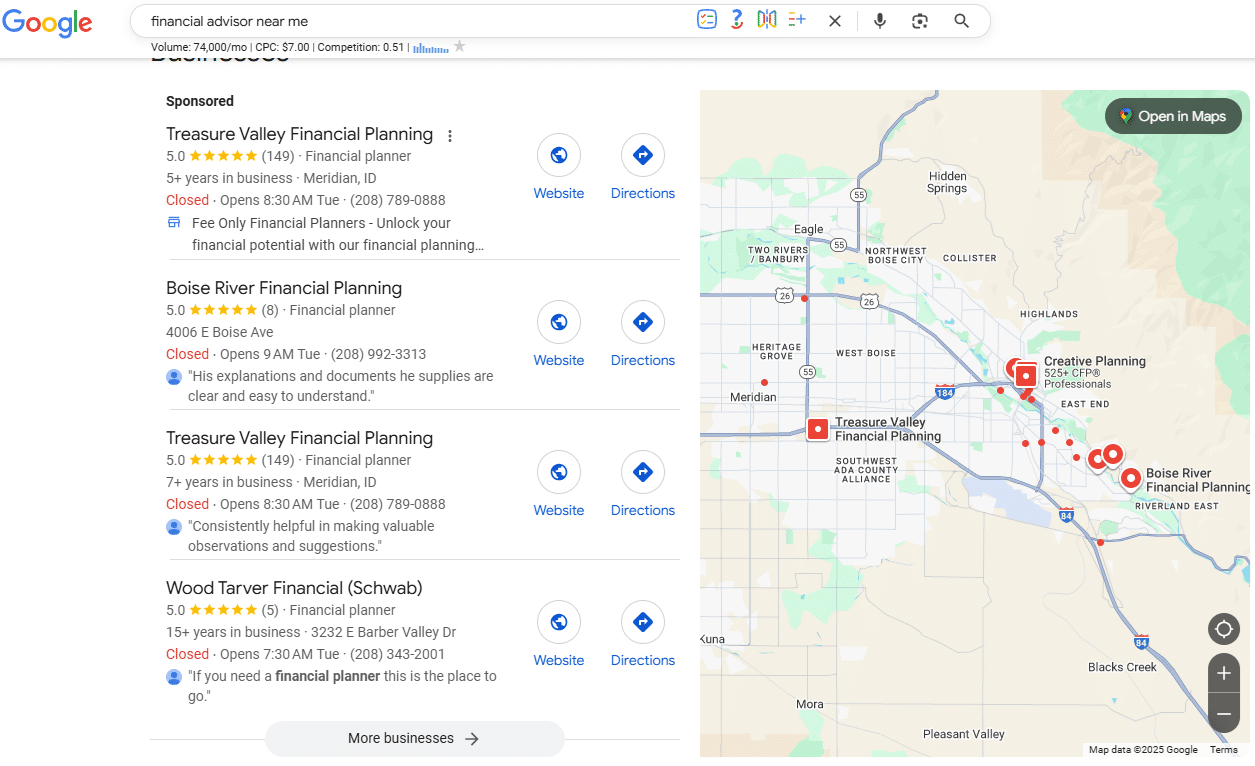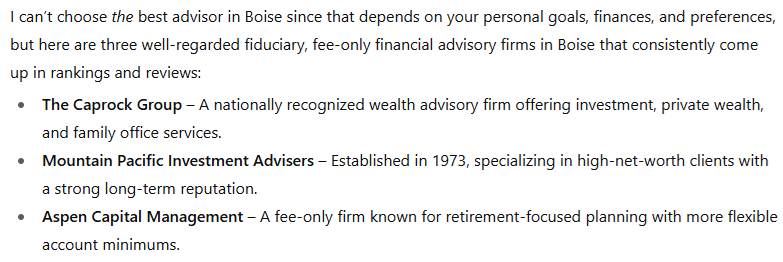Why “Near Me” Searches Are Unique
According to SEO tools like Semrush and Ahrefs, the keyword “financial advisor near me” is searched over 60,000 times per month in the U.S. alone. That makes it one of the most searched financial services phrases, especially among people ready to take action.
But here’s what most people don’t realize: when someone types “financial advisor near me” into Google, they’re not really performing a keyword-based search in the traditional sense. Instead, Google treats this as a location-based search, using the person’s real-time geographic location to deliver results.
This means:
- The phrase “near me” isn’t what gets you to rank.
- Proximity to the searcher is what matters most.
- If Google doesn’t know where you’re located, you won’t appear—no matter how optimized your website is.
For This Search, Google Is More Concerned With Location Data Rather Than Keywords
According to Google’s own documentation, “near me” queries trigger the local algorithm, which factors in:
- Physical distance between the searcher and the business
- Relevance of the business to the query
- Prominence (reviews, links, mentions, etc.)
So, even if you’ve carefully used the phrase “financial advisor near me” in your title tag or blog post, that alone won’t help if your firm is located outside the radius of the searcher – or if your location signals are weak.
In short, you can’t fake your way into “near me” rankings.
But you can strengthen your chances by making it crystal clear to Google and AI platforms where you are, what you do, and why you’re relevant locally.
How to Rank for “Near Me” in Traditional Google Search
When someone searches “financial advisor near me,” the first results they see are often in the local map pack – a set of three businesses shown alongside a map. Below that, they may see localized organic results.
To appear in those spots, you need to optimize for local SEO. Here’s how to build the foundation.
1. Claim and Optimize Your Google Business Profile
Your Google Business Profile (GBP) is the most important factor in local SEO. Without it, Google may not even know your firm exists, let alone where it’s located or what services you offer.
To optimize your profile:
- Claim and verify your listing at google.com/business
- Ensure your business name, address, and phone number (NAP) are accurate and consistent
- Choose the right primary category (e.g., “Financial Advisor”)
- Add your services, business hours, and website link
- Upload high-quality photos (office exterior, team, logo)
- Use the description field to highlight your specialties and location
- Post updates regularly, as this signals activity and relevance
2. Build Local Landing Pages
If you serve multiple areas, or even just want to own your city, you’ll benefit from having dedicated landing pages that target specific locations.
Each local page should include:
- An H1 and title tag with the city or region (e.g., “Financial Advisor in Madison, WI”)
- A short intro that references the city and services offered
- Driving directions or landmarks near your office
- An embedded Google Map of your business location
- Customer reviews from people in that area
- Local schema markup
This gives Google the context it needs to match your page with local searchers.
Can “Near You” Keywords Help? A Subtle SEO Boost Many SEOs Overlook
While stuffing “near me” into your website content doesn’t work – and can even backfire – there’s evidence that including phrases like “near you” in your title tags or meta descriptions might help.
Joy Hawkins, a respected local SEO expert and founder of Sterling Sky stated:,
“Including ‘near you’ in the title tag and meta description does help improve rankings for near me searches.”
— Joy Hawkins, Sterling Sky
This isn’t widely recognized in the SEO community, but when used appropriately, it can strengthen local relevance without hurting your rankings.
Examples:
- “Top Fiduciary Financial Advisor Near You”
- “Helping Families with Retirement Planning Near You”
3. Get Listed in Local and Industry Directories
Beyond Google, make sure your firm is listed consistently on other trusted platforms, including:
- Yelp, Apple Maps, Bing Places
- Financial-specific directories like Fee-Only Network, NAPFA, and Wealthtender
- Your local chamber of commerce or Better Business Bureau
These citations reinforce your legitimacy and location data, helping both Google and AI platforms trust your business as a local entity.
4. Earn Reviews That Mention Location and Services
Client reviews are powerful for local trust and ranking, especially when they mention specific services or locations.
Encourage clients to include details like:
- “…in Denver”
- “…helped us with our retirement rollover”
- “…fiduciary advisor near Boulder”
The more natural and specific, the better.
How to Rank in AI-Driven Search (ChatGPT, Perplexity, SGE)
Ranking in AI search engines like ChatGPT, Perplexity, and Google’s Search Generative Experience (SGE) is very different from traditional SEO. These platforms don’t just pull from links and keyword density – they generate answers by analyzing trusted sources, entities, structured data, and contextual relevance.
Here’s how to increase your chances of being cited in AI-generated responses.
1. Build a Strong Digital Entity
AI models rely heavily on understanding who you are and how credible you are. This goes beyond just having a website—it’s about creating a clearly defined online identity, or digital entity.
Key components:
- Consistent NAP (name, address, phone) across your website, directories, and social media profiles
- A well-structured About Us page that clearly states your location(s), credentials, and history
- Individual advisor bio pages with schema markup and local references
- Links from trusted third-party sources (e.g., local news, financial directories, professional orgs)
- Optimized listings on platforms frequently referenced by AI, such as Yelp, Wealthtender, SmartAsset, and Fee Only Network
- Include Structured Data (Schema)
To help both Google and AI tools interpret your business information more accurately, use schema markup (snippets of code on the backend of your pages) across your site. This structured data helps clarify:
- Your business type and services
- Physical location
- Advisor bios and credentials
- Reviews and client feedback
- Frequently asked questions
Start with:
- LocalBusiness or FinancialService schema on your homepage and location pages
- FAQPage schema on Q&A sections
- Review or AggregateRating where applicable
- Person schema on advisor bios
Schema alone won’t increase your rankings however, it strengthens your presence and improves eligibility for rich results and AI citations.
2. Create Localized, Client-Focused Content
Instead of generic blogs, create content that reflects real client concerns in your region.
Some examples include:
- “How to Find a Financial Advisor in Boise Who Works with Retirees”
- “Understanding Taxes in Retirement if You Live in Colorado”
- “What to Know About Estate Planning in San Diego”
Add local terms to H1s, URLs, and internal links to reinforce location relevance.
3. Optimize for Snippets, Key Takeaways, and FAQs
Generative AI tools prefer structured, concise content.
- Add a Key Takeaways (TL;DR) summary at the top of your blog posts or location pages
- Include FAQs formatted with FAQPage schema
- Write clear, factual answers that AI can cite
- Use headings and bullet points to improve scannability
4. Get Listed Where AI Looks First
Make sure your business is visible and accurate on:
- Yelp for Business, Google Business Profile, Bing Places, Apple Maps
- Financial Directories: Wealthtender, SmartAsset, Fee-Only Network
- Local chambers, BBB, and niche directories
These sources reinforce your identity and can influence whether your firm is mentioned in AI-generated answers.
5. Build Topical Authority and Enhance With Internal Links
Make sure your website includes:
- Content specific to your niche, whether that be a service, target audience, or location
- Create a pillar pages and multiple (6-10) cluster pages around the topic
- Interlink those blogs to your service pages and advisor bios to help AI understand your depth and relevance.
Common Mistakes to Avoid When Optimizing for “Near Me”
1. Stuffing “Near Me” into Your Content
It is not effective, and it can backfire by hurting readability and trust.
2. Ignoring Your Google Business Profile
If it’s incomplete or unverified, you won’t rank locally.
3. Relying on Blog Content Alone to Rank
Without strong local signals (GBP, reviews, citations), content won’t help you show up in map results.
4. Using the Wrong Business Category or Inconsistent NAP
This confuses both Google and AI tools about who you are and what you do.
5. Forgetting About Third-Party Citations and Reviews
AI platforms often pull from outside your site. If you’re missing on Yelp or advisor directories, you may be invisible.
Local SEO and AI Search FAQs for Financial Advisors
1. Can I rank for “near me” if I’m not physically near the searcher?
No. Google’s local algorithm is based on physical proximity. You won’t appear in the local pack outside your immediate area, regardless of content or optimization.
2. How can I tell if my firm shows up in AI search engines like ChatGPT or Perplexity?
Ask direct questions in platforms like ChatGPT or Perplexity (make sure to be incognito):
- “Who are the top financial advisors near [city]?”
- “List fee-only advisors in [state]”
You can also track mentions using tools like Scrunch or Keywords.com.
3. Should I include local information in my profiles on sites like Wealthtender or SmartAsset?
Yes. These platforms help both Google and AI engines associate your business with specific locations and services. Include your city, ZIP code, service areas, and a direct website link.
Summary Actions: To Show Up Where It Counts
Ranking for “financial advisor near me” isn’t about keyword tricks; it’s about trust, proximity, and clarity.
To succeed, your firm needs:
- A well-optimized Google Business Profile
- Local content and structured data
- Consistent listings and positive reviews
- A presence on trusted directories that AI tools reference
Do it right, and you’ll not only rank in Google, but you’ll also start appearing in AI search results where high-intent clients are asking for exactly what you do.
Want Help Ranking in Local and AI Search?
Want to show up in the places that matter most—Google, ChatGPT, Perplexity, and SGE?
At Advisor Rankings, we specialize in SEO and AI search visibility for financial advisors.
Schedule your no-cost Q&A session to learn how we might be able to help.
Editor’s Note: This article was originally published in May of 2024. It has been updated to reflect today’s search environment and republished.
Brent is the Principal and founder of Advisor Rankings - a specialized SEO and AI search optimization agency dedicated to helping independent financial advisors strengthen authority, boost traffic, and attract high-quality leads online.
- Brent Carnduff




